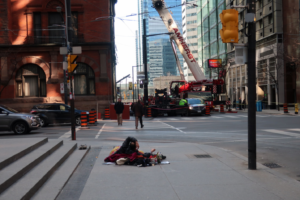By: Lauren Graham
The environmental justice movement addresses the need for equitable access to environmental services. Environmental services are often defined in reference to the spaces where we live, work, and play. Therefore, access to public space is an environmental justice issue.
Disparate access to public lands has had a significant impact on low-income communities during the COVID-19 pandemic. Throughout the pandemic, access to outdoor spaces has offered a relatively safe escape from lockdown. This has differentially impacted low-income communities, who often live in apartments without backyards, and have limited access to public spaces like parks.
However, the issue of access to public land during the pandemic finds its most troubling illustration in the state’s response to homeless people occupying public space (like sidewalks and parks). This is partially due to a pre-existing legal framework that criminalizes poverty. However, as noted in a recent report produced by the Policing the Pandemic Project, the expansion of police powers during the pandemic has led to homeless people being disproportionately charged with COVID-19-related offences.
The existing legal framework around homelessness
Before the pandemic, individuals experiencing homelessness were already subject to police harassment while accessing public space. This is due to a network of provincial legislation that encourages this harassment and municipal by-laws that prohibit means of creating relatively safe shelter.
The Ontario Safe Streets Act imposes severe fines on individuals “soliciting” (asking for money) in specified areas. The Act also permits police officers to arrest individuals without a warrant if they believe “that it is necessary to arrest the person…in order to establish the[ir] identity…or to prevent the person from continuing…the contravention.” This can leave individuals experiencing homelessness vulnerable to police harassment. Furthermore, it often burdens people forced to live on the street with thousands of dollars in fines. This can disrupt key sources of income for individuals experiencing homelessness. These fines also often carry long-term consequences that keep individuals in poverty. As Gerry Williams, who received several fines under the Safe Streets Act, said “My tickets prevented me from obtaining a driver's licence, quality housing, credit or even a good job eventually."
Municipal by-laws are also used to criminalize individuals experiencing homelessness. For example, under bylaw 608-14 of the Toronto Municipal Code, no person may “erect a temporary or permanent tent, structure or shelter…in…a park.” This provision, and others like it in the Municipal Code, have been used to evict residents of homeless encampments. This issue has only worsened throughout the pandemic, which has seen an increase in the number of homeless encampments in Toronto.
The effects of COVID-19 controls
Lockdown measures implemented by the province and the city in response to the pandemic have exacerbated the effects of policing poverty. For example, municipal by-laws impose fines for failing to practice physical distancing that can range from between $1000 and $5000. These bylaws have a disproportionate impact on individuals experiencing homelessness, who are often unable to adhere to physical distancing guidelines for a variety of reasons. Instances of heightened police harassment in connection with the COVID-19 bylaws have already been observed. As Rick Dickson, who received an $880 fine, expressed, “I can’t pay [the fine] anyway…they’re just harassing me.”
These new bylaws can also discourage individuals experiencing homelessness from seeking shelter in homeless encampments. This is problematic because encampments are currently one of the safest available options for individuals experiencing homelessness. Several shelters have experienced COVID-19 outbreaks. Spaces in shelters have also become more difficult to secure during the pandemic. “Sleeping rough” (on the streets or in isolated spaces such as ravines) is also an undesirable option, as it leaves individuals more exposed to harm from the elements and violence. However, some individuals are no longer comfortable staying in encampments, due to the risk of receiving a fine under physical distancing bylaws, putting them at a greater risk of living in unsafe conditions in congregate settings.
What does this mean moving forwards?
On December 26th, Ontario entered a province-wide shut-down in response to escalating COVID-19 infection rates, with a stay-at-home order that came into effect on January 14th. While the text of the stay-at-home order exempted individuals experiencing homeless, advocates have expressed concerns that the order will leave these individuals vulnerable to heightened police harassment, and uneven enforcement of the order. This could threaten homeless individuals’ personal safety by exposing them to a higher risk of experiencing police harassment and dangerous living conditions. It also violates their human rights.
The order was announced following the adoption of similar restrictions in Quebec, which imposed a province-wide curfew on January 9th in response to COVID-19. Premier François Legault initially said that individuals experiencing homelessness would be subject to a fine for violating the curfew. Since then, Quebec has changed its position, indicating that police will use their judgement in deciding whether to impose a fine on individuals experiencing homelessness who were out past curfew.
Imposing fines on individuals experiencing homelessness who are accessing public space to survive also fails to protect the public interest. The fines do not deter behaviour, in large part because many individuals experiencing homelessness have nowhere else to go, especially during a pandemic when shelters are full and unsafe. Without addressing the systemic inequality and discrimination that lead to homelessness, this approach will only further criminalize people experiencing homelessness for accruing fines that they cannot pay. Access to public spaces is critical to the safety and wellbeing of low-income and unhoused persons. It is imperative that our laws reflect the unique challenges these communities face.

https://search.creativecommons.org/photos/c484da72-cc93-49bf-8855-25d09fd2f98e

